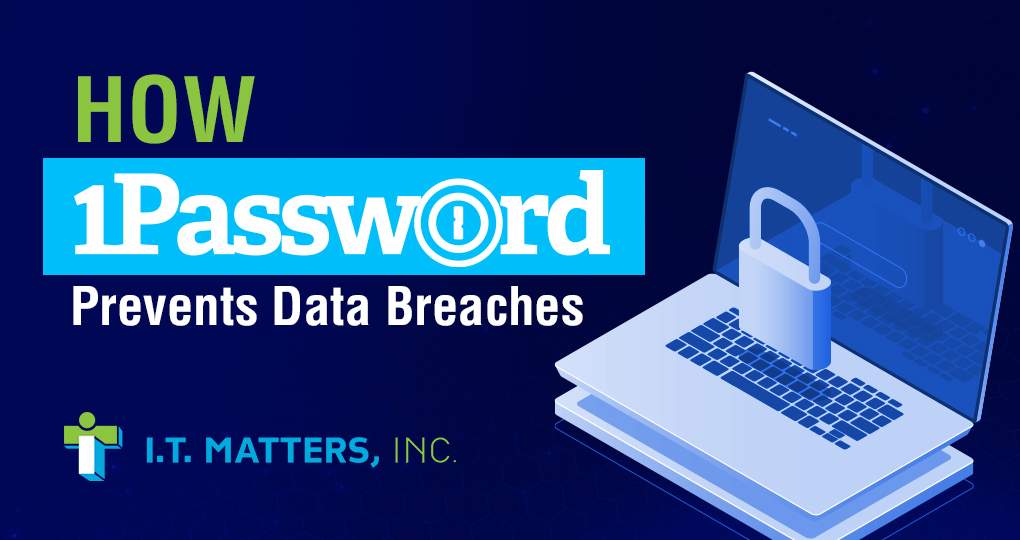Despite the fact that passwords are the most direct way to access a user’s private information, most passwords in use today are simply not strong or complex enough.
Passwords protect email accounts, banking information, private documents, administrator rights and more, and yet, user after user and business after business continue to make critical errors when it comes to choosing and protecting their passwords.
You have a lot of different accounts, so how can you be expected not to repeat a memorable password here or there? It may be nearly impossible to do on your own, which is why you should use a solution like 1Password, the password manager we provide for our clients.
Password Security Is Frustrating, Right?
80% of IT managers feel they are unprepared for an impending data breach—do you feel the same way? It may be your company’s password policies that are putting you at risk.
Outdated and repeated passwords are one of the easiest ways for a cybercriminal to penetrate your systems and steal your data. Are your old passwords threatening your company?
People keep using the same weak and repeated passwords, even after they get breached:
- 57% of people who have already been scammed in phishing attacks still haven’t changed their passwords
- 71% of accounts are protected by passwords used on multiple websites
- The password “123456” is still used by 23 million account holders
The bottom line is that there’s a lot to keep in mind when choosing a password. Strong passwords must be created with the following qualities in mind:
Length and Complexity
Keep in mind that the easier it is for you to remember a password, the easier it’ll be for a hacker to figure it out.
That’s why short and simple passwords are so common—users worry about forgetting them, so they make them too easy to remember, which presents an easy target for hackers.
Numbers, Case, and Symbols
Another factor in the password’s complexity is whether or not it incorporates numbers, cases, and symbols.
While it may be easier to remember a password that’s all lower-case letters, it’s important to mix in numbers, capitals, and symbols in order to increase the complexity.
Personal Information
Many users assume that information specific to them will be more secure—the thinking, for example, is that your birthday is one of 365 possible options in a calendar year, not to mention your birth year itself. The same methodology applies to your pet’s name, your mother’s maiden name, etc.
However, given the ubiquity of social media, it’s not difficult for hackers to research a target through Facebook, LinkedIn, and other sites to determine when they were born, information about their family, personal interests, etc.
Pattern and Sequences
Like the other common mistakes, many people use patterns as passwords in order to better remember them, but again, that makes the password really easy to guess. “abc123”, or the first row of letters on the keyboard, “qwerty”, etc., are extremely easy for hackers to guess.
In the end, creating and using strong passwords can be frustrating—the more secure they are, the more difficult they are to remember. The more memorable they are, the greater threat they pose to the business.
This can be difficult to balance—that’s why we ensure our clients are protected by 1Password..
What Exactly Does A 1Password Do?
1Password is a password manager which generates, keeps track of, and retrieves complex and long passwords for you. It also remembers your PINS, credit card numbers, and three-digit CVV codes, as well as the answers to security questions. All of this is protected by strong encryption that is virtually impossible for hackers to break.
How Do You Set Up A Password Manager?
Using a password manager is rather simple; you simply have to download and install the software. You must also download and install the extensions for the different browsers you use.
If you want to use these password managers on your smartphone, you must download their mobile apps. None of this is complicated and should only take a few minutes.
To set up an account, you must provide your email address, and you’ll also need to come up with a master password—a long, random, complicated one, along with at least one security question. Then you must provide information about your various accounts.
You can either import passwords that you have stored in your browsers or let the password manager store your username and password when you log in to a website. Once you get started, the password manager will help you along the way.
Don’t Let A Weak Password Be The End Of Your Business
In the end, managing a strict password policy, creating strong passwords, and using password managers can be frustrating, but following these security best practices is incredibly important. If you’re unsure about implementing these procedures, you can get a little help from our team at I.T. Matters.
Privacy and security are major concerns for personal users and businesses alike these days, and so you have to be sure that you aren’t making it easy for hackers to access you or your business’ private data.
Get in touch with our team to start enhancing your password security.

Would you like to reduce frustrations with technology and boost operational efficiency within your business? The I.T. Matters team partners with companies of various sizes to help you create a secure, scalable, and flexible technology infrastructure.
Exceptional customer service is at the foundation of everything we do – ensuring that IT projects fully align with your business goals. Our friendly and knowledgeable team continually reviews industry trends and government regulations to help reduce risk and create a more productive IT environment for your business. Whether you are looking for full-service, outsourced IT infrastructure support, or simply need help with an upcoming technology project, contact us to help!

